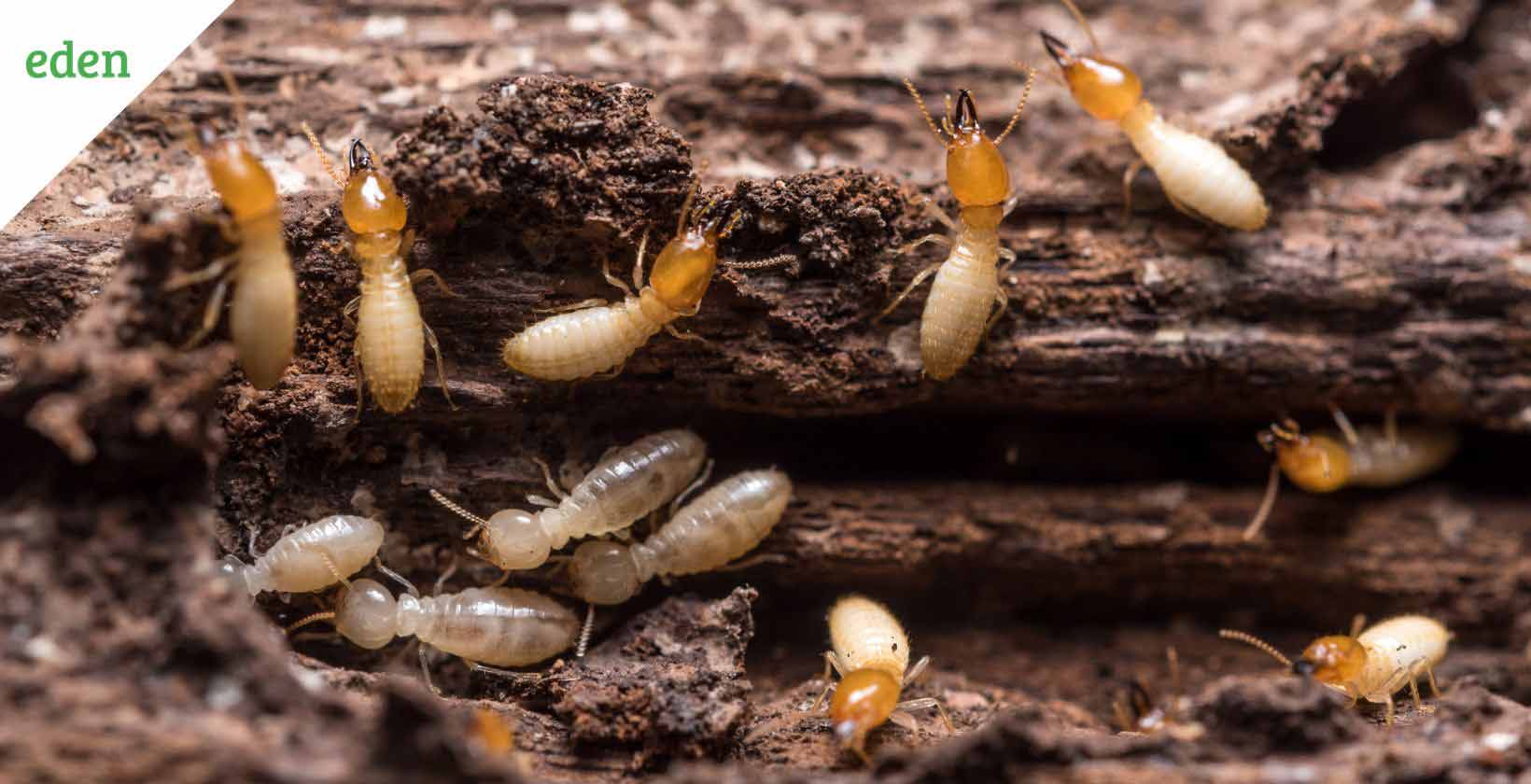
Getting Rid of Termites in your Yard
Eden recommends following some steps to prevent and most effective methods to treat termites. They are ‒ Checking damp spaces, Using Foam termiticide, Termiticide barrier, Using Nematodes and Boric Acids.
Even though termites help balance the ecosystem, they don’t know when to stop. They continue to feed or attack as long as the conditions are favorable. And if left untreated, they can destroy your property or landscape to the extent that it can cost you a lot more than hiring a professional to get rid of termites in your landscape.
1. Check damp spaces
A damp space renders a favorable condition for termites to live. They always look out for areas with moisture. And since they can dry out and die without a steady supply of moisture, these eusocial insects always travel out of the sun and love to crawl in humid places.
Remember that if moisture gets collected in certain areas of your yard, backyard items such as logs, kid’s toys, branches, etc., can become the hot spots for termites. To prevent such situations, you can look for standing water across your lawn or garden. Also, consider using termite-resistant wood if you need to set up a barrier or fence around your yard.
2. Use foam termiticide
Foam termiticide includes the chemical fipronil, which is known to paralyze termites and cause them to die. When you spray the foam on the affected areas, it dries up or evaporates and leaves a residue that gradually kills the termites when they touch it.
To use this chemical effectively, spray the foaming termiticide in spots, into holes, cracks, crevices, and voids where you suspect the termites to be hiding. The effects of this termite treatment will stay for a month and even slightly longer. Continue doing the same if the termite situation persists.
3. Termiticide barrier
The professionals of Eden recommend using conventional termite treatments such as termiticide barriers. Liquid and granule termiticides are somewhat undetectable to termites so they don’t even try to avoid them and crawl right through them.
Since the chemical that carries fipronil gradually paralyzes termites before killing them, they unknowingly carry the poison around with them, infecting other termites and eventually killing the entire colony.
However, there are a few steps you must consider before using termiticide. If you are using granular termiticide, spread it around your yard along with backyard items like wood piles, decaying trees, and other wood structures.
If you use liquid termiticide, consider forming a moat around your yard while letting the chemical soak into the ground. Creating a termiticide barrier like this will ensure that the termites die eventually, even if they get access to your home or yard.
4. Use Nematodes
Several homeowners love to follow eco-friendly practices, which is why Eden brings you the most popular natural alternative to chemical termite treatments. Beneficial nematodes are microscopic, segmented roundworms that act as natural pests to certain insects, including termites. They are an effective natural insecticide that enters a termite’s body and can poison its blood.
Since nematodes live in various habitats, they are pretty easy to locate. Using them as natural parasites for termites is also helpful because they aren’t harmful to humans, pets, or plants. Also, this process will last long since nematodes breed and multiply independently.
You can find nematodes in any garden supply store and even online. Follow the instructions mentioned on the packaging and apply the mixture to the infested areas of your yard.
5. Boric Acids
This particular method is a tried and tested procedure that effectively kills termites. Boric acid is a processed version of the natural mineral boron. It complicates a termite’s metabolic and digestive system while affecting its ability to absorb nutrients, resulting in death. This chemical dehydrates the termites and shuts down their nervous system.
Boric acid is usually available in powder form, which you can disperse using a powder sprayer. You can also use one teaspoon of boric acid for every cup of water and make a solution to diffuse around your yard wherever you suspect termite infestation. While you carry out the process of spraying or scattering boric acid, consider wearing goggles and a dust mask for your protection. However, keep in mind that boric acid dries out and kills plants and grass, unlike the other methods mentioned above.
What factors in your yard are most likely to attract termites?
You must be doing everything and taking precautions to stop termites from reaching your yard and house, still, you might see termites in your yard. Well, termites are known to consume wood. They might look a bit similar to ants, and have a nest or colony, just like ants. The possible factors that make your yard a favorable space for termites are:
- Tree stumps (deadwood).
- Outdoor woodpiles.
- Moisture issue.
- Mulching can give rise to moisture.
- Excessive water accumulation.
- Digging or tilling of treated soil.
- Poor soil drainage.
- Leaky faucets over a treated soil band.
- Moist wood because of roof leaks or condensation.
- Any activities affecting the treated soil band.
Are termites a problem in the garden?
Apart from wood, termites feed on the cellulose in plants which is why they are also attracted to your garden. Termites pose a huge threat to vegetable gardens, flower beds, and potted fruit trees. It is important to understand that termites can attack your plants or garden at any growth stage.
They can damage the seedlings and even affect the mature plants through the roots. And no matter what plant or trees you have in your yard or garden, if they are dead or rotted, they are the prime target of termites.
How much does it cost to get rid of termites in your yard?
The cost of termite treatment varies depending on various factors, including how big of a problem your termite situation is. However, the lowest price ranges between $70 – $230, where $135 is the low average cost that most homeowners pay. At the same time, the average cost ranges anywhere from $275 – $930, with most homeowners paying $550. But given the factors that can affect the cost range, termite treatment costs as high as $1,350.
Is lawn termites treatment effective?
While liquid and bait methods are best suited for eliminating termite infestation, the effectiveness depends on which method you are willing to apply. However, it is vital to understand that even with the best treatment, sometimes you don’t completely get rid of termite infestation, especially after the first try.
Hence, Eden recommends assistance from professional pest control companies that can help you with the best termite treatment to protect your yard and garden.
To conclude, to get rid of termites in your yard, apply one of these methods ‒ Use Foam termiticide, Termiticide barrier, Use Nematodes and Boric Acid. Termite treatment costs start from $70 and can go as high as $1350 depending on the extent of the infestation.
Contact today to get in touch with our Eden experts for landscape inspection and exceptional pest control services.
Enjoy a beautifully manicured lawn with our timely yard work services that care for your yard according to the season. Call us today!

